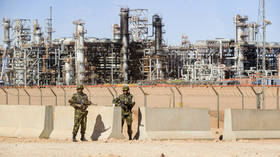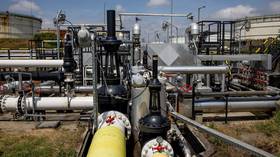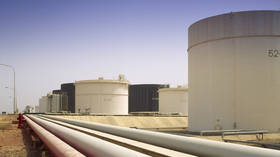Scientists issue warning over EU's substitute gas supplier

A compressor station at the Hassi R’Mel gas field in Algeria has been leaking large quantities of methane, a powerful greenhouse gas, for nearly four decades, scientists from Valencia Polytechnic University have warned after analyzing satellite data.
The results of the study risk complicating the EU’s climate goals as Algeria is seen by Brussels as a substitute for Russian gas supplies, which the bloc intends to abandon in response to the conflict in Ukraine, Bloomberg reported on Tuesday.
It’s difficult to estimate the total amount of emissions from the facility, but the researchers believe it’s releasing around 4.5 metric tons of methane into the atmosphere every hour.
According to other estimates by Kayrros SAS, a geoanalytics firm, the emissions from the whole Hassi R’Mel gas field spiked by a staggering 67% last year, reaching 939,000 tons of methane, which has 84 times the warming power of CO₂ in the short term.
Experts claim that such an amount delivers the same damage to the environment as 17 million cars.
Algeria currently supplies around 8% of the EU’s gas, but the volumes could grow if the bloc fulfills its plan to give up on Russian supplies. Last week, European Commission President Ursula von der Leyen reiterated that the EU’s goal in the long run was to “get rid of the overall dependency on Russian fossil fuels, all three of them [gas, oil, and coal], and never to go back again.”
However, Brussels has acknowledged that it can't cope without gas from Russia at the moment. The high emission levels could make it hard for the EU to deal with Algeria due to the green policies pursued by the bloc.
Scientists have long known Hassi R’Mel to be a methane hotspot, but, according to Bloomberg, the fresh analysis will put even more pressure on European lawmakers to tighten controls on leaks in the North African nation.
However, persuading Algiers to act might be complicated in the current situation, Antoine Vagneur-Jones of the clean energy research group BloombergNEF said. “The danger now is that Algeria holds more of the cards” due to the push by Brussels to cut energy ties with Moscow, he pointed out.
Algerian state oil and gas company Sonatrach, which runs the Hassi R’Mel gas field, claims that its own emission estimates are “much lower than those announced elsewhere.”
Algiers also wasn’t among the 100 capitals that pledged to reduce emissions by 30% by 2030 during the UN Climate Change Conference in Glasgow last year.














